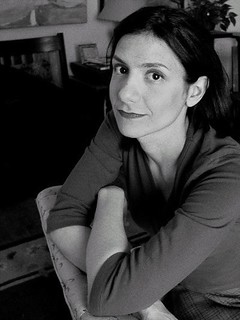Recently, Lisa Timmel, the Huntington’s director of new work, exchanged emails with playwright Gina Gionfriddo about her play Rapture, Blister, Burn. Their conversation centered around feminism and the eternal bonds and conflicts of mother/daughter relationships.
 LT: When you started writing Rapture, Blister, Burn, were you thinking consciously about feminism today?
LT: When you started writing Rapture, Blister, Burn, were you thinking consciously about feminism today?
GG: Actually, I was fascinated by the way access to pornography has changed in my lifetime. I read a lot of books about the impact of internet pornography, and what I found was there are books that say it’s the end of American civilization, and there are books that say it’s no big deal, and there are books that say nobody knows. So it was a fascinating thing to research, but I didn’t come away with any useful conclusions. I knew I had to start something and I had the germ of a situation: Catherine coming home. I knew that I wanted this stuff to be Catherine’s area so that all that research wouldn’t be in vain. And it sort of spun out from there.
With so much of the culture regarding feminism as undesirable, and even young, independent-minded women saying things like “I’m not a feminist but...,” were you surprised at the positive response the play received critically and/or with audiences?
I was very pleasantly surprised. Every so often we (the theatre community) get together to talk about why more female playwrights aren’t being produced. One reason, I think, is that plays about male protagonists in turmoil about who they are versus who they want to be are regarded as classic coming-of-age tales, whereas the same kind of play about a female protagonist is often seen as a story about a neurotic. So I was very concerned that the women in the play would be written off as neurotics and harpies rather than very normal women asking questions about their lives. I thought women would enjoy the play. Perhaps the biggest surprise was how many male audience members got excited about it. It’s the first of my plays that my brother really got excited about and that just shocked me.
During the play’s premiere last spring, Anne-Marie Slaughter’s article “Why Women Still Can’t Have it All” was published in The Atlantic and, of course, Sheryl Sandberg’s book, Lean In was recently published. Like all great playwrights, you have your finger on the pulse of the zeitgeist. Do you have any thoughts on why this conversation is happening now? Does the high-profile nature of the conversation about women and leadership change how you think about the play at all?
I feel terrible that I don’t have an answer for you here! I would love to know why this discussion has moved to the front burner recently. I wonder if Hillary Clinton being a serious contender for the presidency may have nudged the door open some, but I don’t know. And I think, perhaps, that women get gutsier about having these conversations and using the “F word” (feminism) when they feel their rights are really, truly in danger. The only thing I had my finger on the pulse of was my own 40-year-old anxiety about being a childless woman with a very old mom. I was in the process of trying to have a baby, but it wasn’t happening easily, so I think I was just interested in looking at women who did and did not start families. What are the pros and cons of that very major choice?
Many of your plays include wonderful, complicated mother figures, Ashley in After Ashley and Susan in Becky Shaw. In Rapture, the mother-daughter relationship between Cathy and Alice is the central emotional bond. What does the inter-generational conversation give to your plays?
I think, speaking really generally, we grow up determined not to make our parents’ mistakes. We kind of scrutinize their lives and plan accordingly. We plot how we’ll do better and be happier. You see that with the college student in my play, the way she imagines her life will be better than the middle-aged ladies she’s in class with. I think in our teens and our twenties we often feel we know better than our parents and then as we get older... that dynamic shifts some. I think in both Becky Shaw and this play, we see women who tried really hard not to live their mothers’ lives wind up sidling up to them in search of wisdom.





 A popular assumption about feminists — not just among certain right-wing personalities — is that they are ugly, sexless, humorless harpies that no man wants (unless women advocate for access to birth control, then they are common sluts). In Rapture, Blister, Burn, Gina Gionfriddo grapples with the realities of women’s lives and pulls off a popular comedy about feminism. Fortune favors the bold and, as noted by Variety, “Gionfriddo’s some kind of genius.”
A popular assumption about feminists — not just among certain right-wing personalities — is that they are ugly, sexless, humorless harpies that no man wants (unless women advocate for access to birth control, then they are common sluts). In Rapture, Blister, Burn, Gina Gionfriddo grapples with the realities of women’s lives and pulls off a popular comedy about feminism. Fortune favors the bold and, as noted by Variety, “Gionfriddo’s some kind of genius.”